What Services Will Ventura Cut In The 2020-2021 Budget?

“Another Fine Mess You’ve Gotten Us Into, Stanley.”
—Laurel & Hardy

The 2020-2021 budget presents a challenge to the City Council. This Council must weigh how to close the budget deficit in the coming year.
The Coming Problem
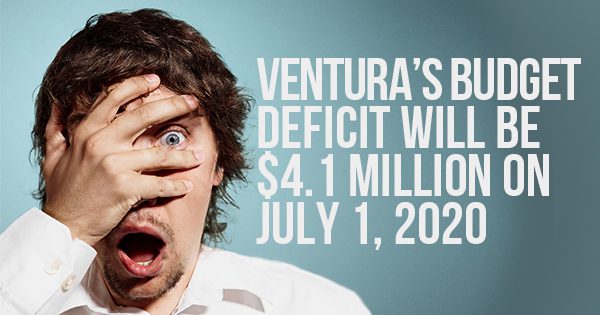 Today’s Council is still operating on the 2019-2020 budget that shows everything is fine. In six months we will be in a new budget cycle, how does that look? The city staff projects a “most likely” budget scenario that will have a shortfall of $4.1M. How can the seven members of the City Council take action to save jobs and essential services for the citizens of Ventura?
Today’s Council is still operating on the 2019-2020 budget that shows everything is fine. In six months we will be in a new budget cycle, how does that look? The city staff projects a “most likely” budget scenario that will have a shortfall of $4.1M. How can the seven members of the City Council take action to save jobs and essential services for the citizens of Ventura?
The Seriousness of the 2020-2021 Budget
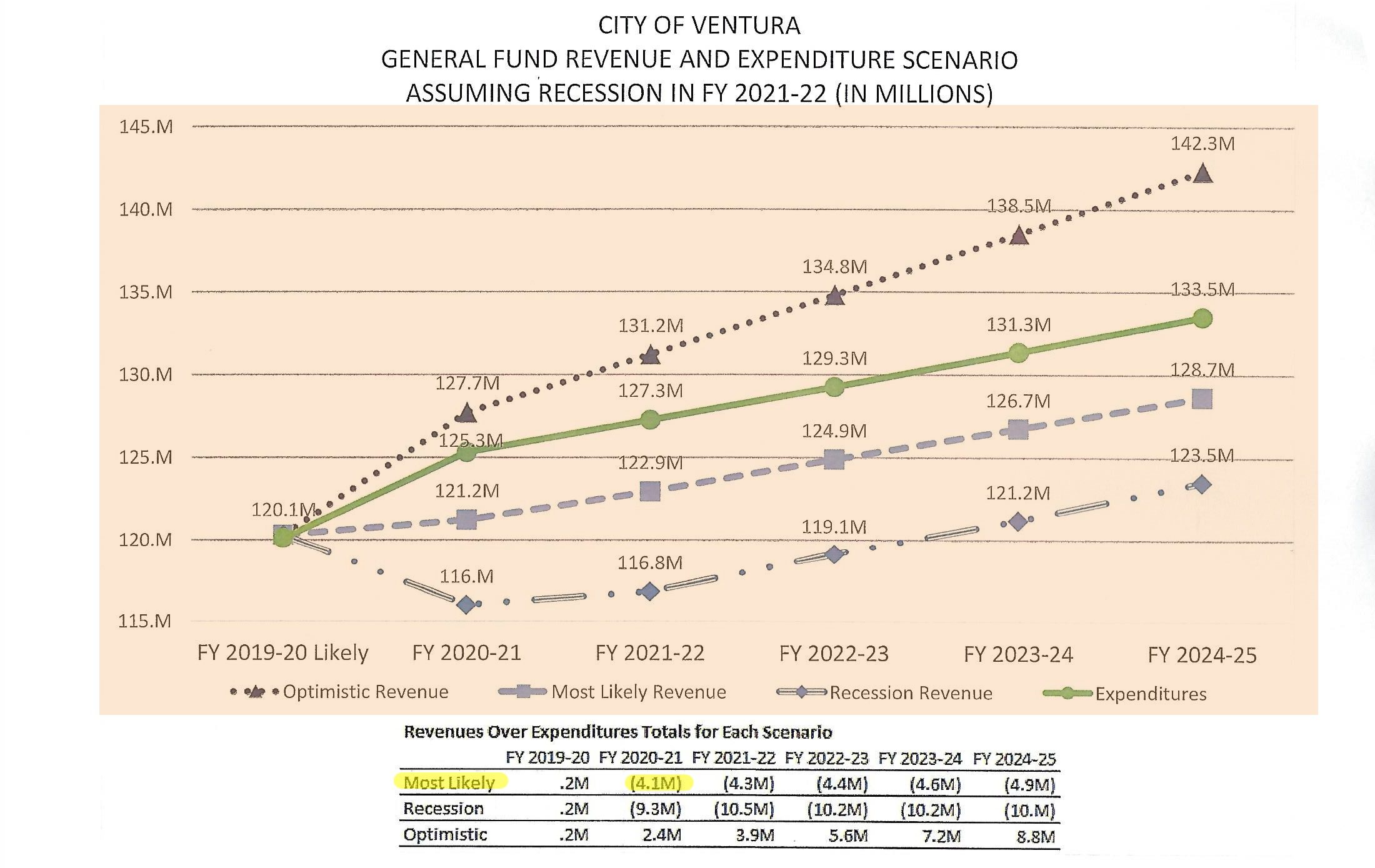
In two of these three scenarios, Ventura residents should be concerned about possible severe cutbacks in services and personnel. Ventura has a 67% probability of significant shortfalls in the next fiscal year and the next four years after that. This Council may play a game of fiscal musical chairs with the budget hoping the music doesn’t stop and throw the city into insolvency. Is there a better solution? It may be time for the Council to focus on a multi-year budget to better spend the limited money available to us.
The Council must come to a decision soon and may need to cut back services and personnel. If they don’t, the specter of insolvency looms over the city. The Council should inform citizens and allowed them input before taking drastic measures. Please keep reading!
What Can The Council Do With The 2020-2021 Budget?
The city staff presented the Council with several options to consider remedying the projected shortfalls. The team looked at revenue and expense items available to the Council.
Potential Revenue Enhancements to the 2020-2021 Budget
- The added revenue from proposed changes to Prop 13. These changes are beyond the City Council’s control. They are purely wishful thinking at this time.
- Increase the Transit-Occupancy-Tax (TOT) rate. The TOT, also known as the bed tax, impacts tourists visiting the city. Each 1% rise in the tax generates an additional $600,000 in revenue. The downside of increasing the TOT is that it makes Ventura less desirable for tourists to visit or may shorten a visitor’s stay.
- Additional revenue from cannabis sales might generate $500,000 or more. Prop 64 made recreational marijuana use legal, yet Ventura has been slow to embrace pot sales. Outgoing Police Chief Ken Corney believed Ventura should exercise caution when rolling out cannabis. Yet, even if Ventura pushed hard for cannabis sales, the revenue would barely dent the projected $4.1 million deficit.
- Other revenue-generating ideas. The city staff didn’t elaborate on what those ideas might be.
Potential Expense Reductions to the 2020-2021 Budget
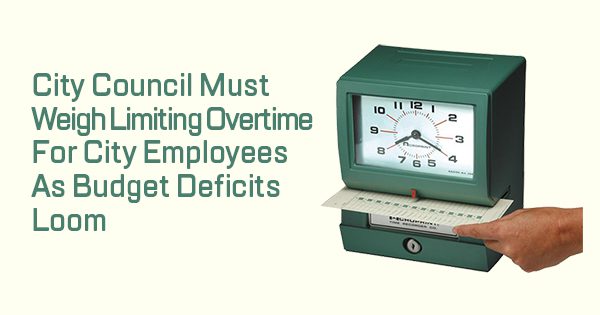 Reduce overtime for city employees. The largest single expense category in the city is staff salaries and benefits. Reducing overtime might save as much as $5.6 million in the budget.
Reduce overtime for city employees. The largest single expense category in the city is staff salaries and benefits. Reducing overtime might save as much as $5.6 million in the budget.- Reduce “extra help” expenses. Such a reduction would generate $2.3 million in expense reduction. Extra helpers supplement city workers.
- Reduce anticipated pay increases. That means fewer raises or smaller raises for city employees. Every 1% decrease in pay raises contributes approximately $800,000 in savings.
- Transfer some Information Technology (IT) or Internal Services Fund (ISF) costs to Measure O. The city staff believes transferring some of these costs to Measure O will support staff needs. The cost savings would be $120,000. If they do move those costs, though, it will represent a shift in policy.The Measure O proponents told voters the money would address specific needs. IT and ISF costs were not among those needs. Measure O money goes into the General Fund, so the City Council can use it as they see fit. Yet, using it for operating purposes would invalidate the spirit of the sales tax increase. Using Measure O breaks one of then-Mayor Erik Nasarenko’s promises of the Measure’s benefits. The Measure O Oversight Committee should be concerned.We warned you.
- Review warehouse costs. This alternative lists no amount of savings.
- Review all discretionary spending:
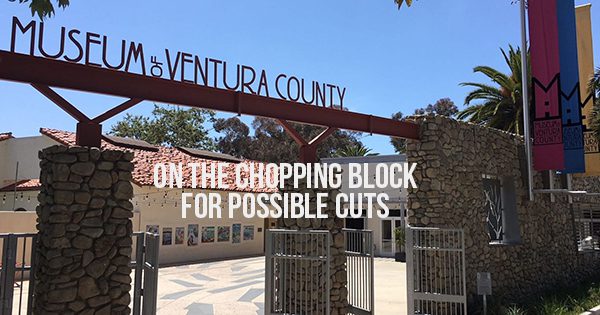 Review the money Ventura pays to support the Ventura County Museum. This option will save $250,000 per year. Prior Councils agreed to give the museum more than $1 million through the fiscal year 2022-23.
Review the money Ventura pays to support the Ventura County Museum. This option will save $250,000 per year. Prior Councils agreed to give the museum more than $1 million through the fiscal year 2022-23.- Review the money spent on Ventura’s Libraries. Savings could be as much as $250,000 per year. No one mentioned the unintended consequences of such a cut, however.
 Evaluate Community Granting Programs. The amount of potential savings is not listed. This category includes programs like Community Access Partners (CAPS). CAPS received a contentious fourth amendment through December 31, 2019.
Evaluate Community Granting Programs. The amount of potential savings is not listed. This category includes programs like Community Access Partners (CAPS). CAPS received a contentious fourth amendment through December 31, 2019.- Assess contributing to Ventura’s Visitors Bureau. The savings could be as high as $968,000.
- Examine other discretionary spending. This alternative included no specifics.
Potential Use of Fund Balances
- Use $3 million in 2021, $2 million in 2022 and $1 million in 2023 (or some other variation) from the Unassigned Funds.
- Use the Catastrophic Reserve of $15 million if a recession strikes.
- Use Measure O revenue. Certainly not its intended goal.
These three options are the most troubling items presented by the city staff. Using the city’s various fund balances should be considered as a last resort and, while it’s prudent for city staff to present them as options, the City Council should consider using them only in dire circumstances.
Considering the 2020-2021 Budget
The city staff assumed some projects would continue as planned. That is a false assumption. The City Council should consider all alternatives. More than ever, the Council should review “Business As Usual.”
- Do we the Citizens want to authorize spending up to a BILLION dollars on a water project?The Water Agency and the Council continue to put forward the need to spend $1 billion because we need drinking water, thus the need to use recycled wastewater by building VenturaWaterPure to satisfy supply needs. Are there regulations in place to allow that? The State of California won’t have an approved test for water safety until 2024, at the earliest. Seemingly the purpose behind this is that the Council needs to ship the Santa Clara River effluent somewhere else. Yet, they could choose the most cost-efficient option of shipping that water to Oxnard’s Advanced Water Treatment Facility. A $70 million option versus $1 billion. What do the citizens want?
- Should the Council ask city employees to contribute a higher percentage of their pay towards their retirement?
- Should the Council consider options for the Fire Department? Evaluate whether to merge Ventura Fire with Ventura County fire?
- Shouldn’t the Council and citizens know precisely how Homeless services cost and how they get allocated? Let’s ask for the facts as citizens. Just some of the costs include:
- The Homeless Shelter ($712,000 per year)
- The police Homeless Task Force (seven officers)
- A Safe & Clean Program manager
- An embedded mental health professional
- The Downtown Ambassadors
- The police and fire personnel that answer service calls in addition to the Homeless Task Force
Editors Comments
We’re confronted with several key questions when considering the 2020-2021 budget. How is it that after more than ten years of economic growth and market growth, and the imposition of a sales tax increase, we are about to face a sudden, significant budget deficit? We believe it’s the cumulative effect of more than a decade’s worth of poor economic policy choices by both the city government and the citizens.
Ventura hasn’t projected a budget deficit this large since the 2008-2009 Recession. With the stakes this high, there is little room for error. Poor decisions could lead to the city’s insolvency.
Yes, we must solve the current budget shortfall. We expect this City Council will focus on meaningful change and keep citizens informed. This Council has a difficult task ahead and must weigh how to best spend the limited revenue we have and substantially cut expenses to close the budget deficit.
Citizens expect the Council to be astute when evaluating these alternatives and to have staff report as clearly as possible. That’s why we believe taking on a $1 billion water project is lunacy without direct input from the voters.
The decisions the Council make with the 2020-2021 budget will have consequences for years to come. Citizens must help with input and oversight. Please consider contacting your representative and let them know you are concerned, want to be informed, and are watching the process.
Tell City Council You’re Concerned, Want to be Informed, and Are Watching the Process.
Below you’ll find the photos of our current City Council. Click on any Councilmember’s photo and you’ll open your email program ready to write directly to that Councilmember.
 |
 |
|
 |
 |
|
 |
 |
|
 |
For more information like this, subscribe to our newsletter, Res Publica. Click here to enter your name and email address.

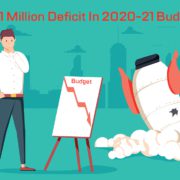


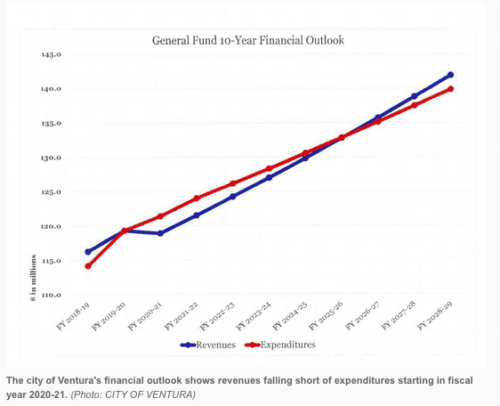
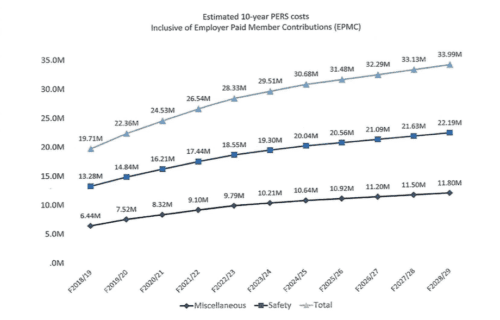
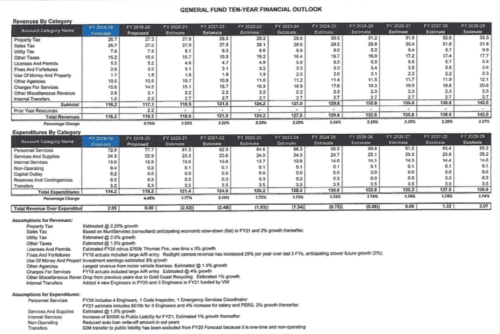
 A second problem is how special interest groups lined up to get their share of Measure O. At the May 20th City Council meeting, Councilmembers Lorrie Brown, Jim Friedman and Mayor Matt LaVere tried to move funds from Measure O to the General Fund for Fire Station No. 4.
A second problem is how special interest groups lined up to get their share of Measure O. At the May 20th City Council meeting, Councilmembers Lorrie Brown, Jim Friedman and Mayor Matt LaVere tried to move funds from Measure O to the General Fund for Fire Station No. 4.  Economic disasters are all around us. There is no reason to think that Ventura is immune to them. The City of Oxnard is preparing to lay off hundreds of employees. They also plan to close a fire station and reduce the number of fire personnel available to respond to emergencies. The Oxnard City Manager says, “We are down to bare bones.” What’s happening in Oxnard is a preview of what could happen in Ventura unless the City Council acts quickly.
Economic disasters are all around us. There is no reason to think that Ventura is immune to them. The City of Oxnard is preparing to lay off hundreds of employees. They also plan to close a fire station and reduce the number of fire personnel available to respond to emergencies. The Oxnard City Manager says, “We are down to bare bones.” What’s happening in Oxnard is a preview of what could happen in Ventura unless the City Council acts quickly.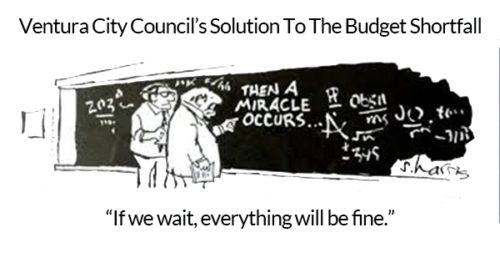 The budgetary crisis is entirely avoidable if the City Council acts now. The solutions are simple, but they are not easy. It requires significant political will and resolve.
The budgetary crisis is entirely avoidable if the City Council acts now. The solutions are simple, but they are not easy. It requires significant political will and resolve.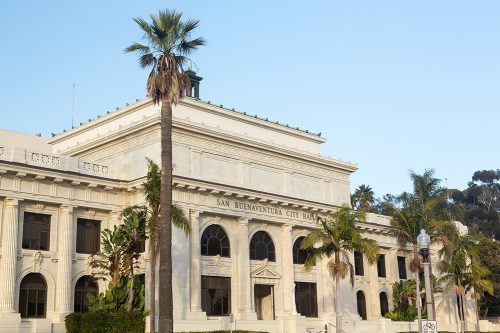
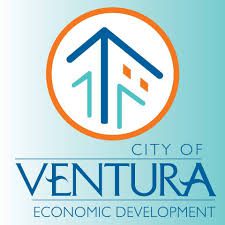 Imagine the stimulus to the community of filling the old Star Free-Press building or the Toys-R-Us location would have.
Imagine the stimulus to the community of filling the old Star Free-Press building or the Toys-R-Us location would have.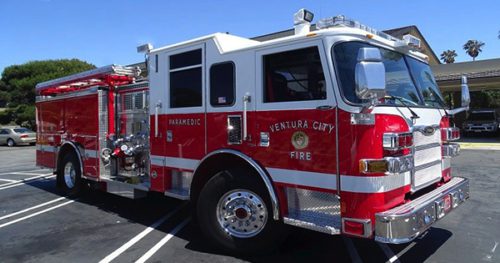 Any change to the Fire Department would likely be unpopular with the public. That makes it a subject considered by Councilmembers, to be too controversial to discuss. The fire department union will become protective of their fellow firefighters and will want to preserve the status quo.
Any change to the Fire Department would likely be unpopular with the public. That makes it a subject considered by Councilmembers, to be too controversial to discuss. The fire department union will become protective of their fellow firefighters and will want to preserve the status quo.